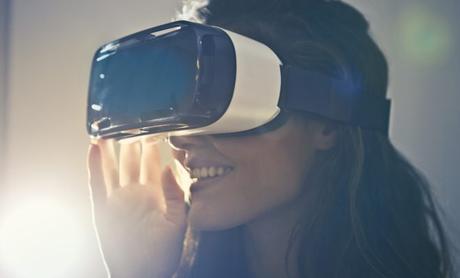
It's no secret that the tech industries have a serious diversity problem in general. According to a 2018 report by the National Center for Women & Information Technology, women hold just 26% of technology-related roles. This doesn't just illustrate the problematic systemic biases against talented women, it also serves as a reminder that we continue to truncate our technological trajectory by excluding the ideas of diverse minds. That's not to say that women aren't making some incredible strides across all STEM sectors, as creative female-led projects are frequently proving to be innovative. There are multiple movements which encourage the rise of women who code, and present us with valuable, diverse role models. The VR industry in particular has attracted talented women to a wide variety of positions. It continues to present new possibilities for exploration and invention.
While the demographics for the gaming sector still slant heavily toward males, women are emerging as VR heavy hitters. These pioneers are developing creative concepts and exploring previously untapped resources in order to make VR more than just another gaming platform. Women are creating tools to produce a positive impact on the world.
Industry Leadership
One of the ways in which women are shaping VR technology, and the industry as a whole, is as entrepreneurs. A 2017 survey of US-based VR firms showed that 64% of leadership roles are held by women. These entrepreneurs are recognizing the potential of the technology and presenting innovative ideas that have attracted significant investment. Both software and hardware have reached a point where they are practical and affordable; this is an exciting time for development. VR is still very much in its infancy, and creative businesswomen are becoming early influencers of the direction the industry is taking.
One such area of innovation through VR is in medical fields. In 2016, mechanical engineer Isabel Van De Keere saw the possibilities that new technology could have in rehabilitation. As a result, she founded Immersive Rehab; a company that creates interactive physiotherapy programs in VR spaces. Their work is targeted at people with neurological limitations as a result of stroke and multiple sclerosis, among others.
Entrepreneurs are also pushing tech that provides valuable cultural experiences to diverse audiences. Elizabeth L Reede, an investment banker and former curator at MoMA, co-founded Boulevard Arts with this in mind. Her company has been exploring ways in which VR platforms can bring museum and gallery experiences to those who cannot physically visit them. Boulevard helps users transcend accessibility and financial obstacles, and connect with works of cultural significance.

The Arts
While video games certainly attract their fair share of artists, VR has opened artistic possibilities beyond gaming. Creative women have been among the first to seize the opportunity to explore the ways tech can be used to create immersive experiences. From fine art, to sculpture, to film, women are pushing the boundaries of VR to make important interactive works.
Deborah Rodrigues, AKA Tartaruga Feliz, creates VR and AR artwork - both in traditional gallery spaces and online. An illustrator and former video game entrepreneur, Rodrigues has also been instrumental in encouraging children to engage with the blend of advanced technology and the arts. Her Gluck Workshops are an innovative approach to learning through creativity, while improving digital literacy and promoting STEAM education.
There are also many women who are embracing VR as a viable film-making and broadcasting tool. Paisley Smith has emerged as a prominent creator in the field. She uses interactive tech to produce stories that help audiences connect more deeply to social issues. Project VR Syria was selected for the New Frontier program at the Sundance Film Festival in 2015. Smith has also co-founded the group, Virtual Reality Girls, as a space to connect with and celebrate women who are creating in the VR realm.

An Agent for Change
Aside from the technological, medical, and artistic possibilities, VR offers potential as an agent for change. We are faced with challenges in all industries - from the ethical treatment of women in entertainment fields to closing pay disparity. We are also being more creative in our approach to tackling these problems. One of the primary advantages of our tech revolution is that access to advanced electrical engineering inventions is connecting communities in meaningful ways. Pioneering women are continuing to find that VR can be a tool to encourage these connections to result in an evolution of social attitudes.
Equal Reality was created with the idea that increased empathy can positively affect behavior. Allison Reid and Annie Drake are part of the founding team dedicated to creating VR scenarios that introduce users to situations from a new perspective. Including showing male users the world through the eyes of a woman. Their approach to VR is intended to help users identify personal biases, and inspire behavioral and cultural changes.
Nonny de la Peña, selected by Wired magazine as their #MakeTechHuman Agent of Change, has also been dubbed the "godmother of Virtual Reality" by several major media outlets. She began experimenting with VR as a senior research fellow at USC in 2009. Soon afterward, de la Peña began work on projects which brought a new and immersive dimension to journalism, each with a focus on social issues such as reproductive rights, and homelessness. One notable example is Across the Line, a VR experience that places viewers in the shoes of a patient attempting to access a safe and legal abortion. The project utilizes documentary footage, scripted scenes, and audio gathered from anti-abortion protests to navigate the user through the gauntlet still faced by women in the US today.
Conclusion
Tech industries still have a long way to go before they can truly be considered gender-inclusive. However, while it is still very much in its infancy, women are proving to be major innovators in the rise of virtual reality. Their work is changing lives, and shaping culture. Women are leading this new industry into creative and valuable places, as pioneers of virtual space.
This guest post was authored by Dan Matthews


Ms. Career Girl was started in 2008 to help ambitious young professional women figure out who they are, what they want and how to get it.

